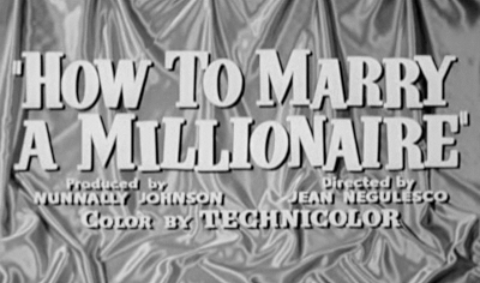How to Marry a Millionaire
An Economic Update on the 1953 Film
 In 1953, a great movie starring Lauren Bacall, Bette Grable and Marilyn Monroe was released called How to Marry a Millionaire. I got curious as to how much money it would take to equal the same net worth today so I did an inflation adjustment because I wanted to know how big their motivation was in the film.
In 1953, a great movie starring Lauren Bacall, Bette Grable and Marilyn Monroe was released called How to Marry a Millionaire. I got curious as to how much money it would take to equal the same net worth today so I did an inflation adjustment because I wanted to know how big their motivation was in the film.
Turns out, someone who had $1 million in 1953 would have roughly $8 million today. That kind of asset base should generate cash dividends or interest of $34,000 per month without working, while still providing for inflation, taxes and some reinvestment to keep earnings growing in the future.
That means that every twelve months, another $408,000 would be deposited into your bank account and you could spend every penny without ever worrying about running out of cash. It would seem that $34,000 per month would certainly be enough to live however you wished without ever going into debt. Want a new Mercedes S Class? Wait three months and write a check, or take advantage of a 0% financing offer and give up only $1,800 of your $34,000 each month for the next five years. How about a $100,000 redecorating budget? It would only take 90 days to achieve paid in full.
Although it is certainly not Buffett or Gates money, I would think that 99% of the population would be perfectly content on that level of purchasing power. It would let you get used to $400 bespoke tailored shirts and $4,000 custom bespoke shoes. You could give generously to charitable organizations and support worthy causes. You would sleep with cashmere blankets, eat on gold-rimmed china with sterling silverware, and wear Creed.
These numbers would scale proportionately with each additional million dollars in net worth. For someone with $2 million in 1953, it would be the same as $16 million today, which would generate $816,000 net cash deposited into their accounts each year and $68,000 in net monthly income after inflation, reinvestment and taxes.
It is interesting to me that a 1953 millionaire coincides almost exactly to the so-called Capitalist Class today, which is the top 0.9% of income in the United States.
[mainbodyad]


